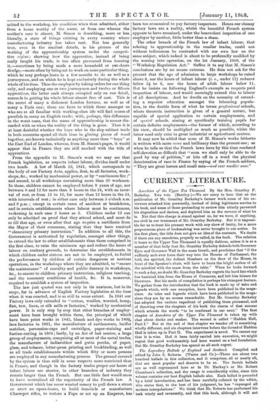CURRENT LITERATURE.
Anecdotes of the Upper Ten Thousand. By the Hon. Grantley F. Berkeley. Two vols. (Bentley.)—We are sorry to hear that on the publication of Mr. Grantley Berkeley's former work-some of his re- viewers attacked him personally, instead of doing legitimate service to his book, and some of those pretending to review him utterly perverted his disposition and desires, and depicted him as the reverse of what he is. Not that this charge is aimed against us, for we were, if anything, too civil in our treatment of Mr. Grantley Berkeley. But it is impossi- ble for us to treat his present work with any show of lenity, for a more preposterous piece of bookmaking was never brought to our notice. In the first place, the title does not give an idea of the contents. We doubt if there are any anecdotes, properly so called, in the book. The relation it bears to the Upper Ten Thousand is equally dubious, unless it is as a member of that body that Mr. Grantley Berkeley defends both Governor Eyre and Governor Wall in the same breath, and proclaims that "if the ruffianly mob ever force their way into the Houses of Parliament, the bold, the spirited, the defiant Members on the floor of the House, in front of the Speaker's chair, will have to brain the bright author of all the mischief with the mace from the table." When he looks forward to such a day, no doubt Mr. Gran they Berkeley regrets the hard fate which has banished him from the House of Commons, and left him leisure for literature. But his mode of compilation is perhaps his strangest feature. We gather from the introduction that the book is made up of tales and legends which, with one exception, have been published in the maga- zines. As tales and legends which have been published in the maga- zines they are by no means remarkable. But Mr. Grantley Berkeley has adopted the curious expedient of publishing them piecemeal, and of throwing over the chapters of his book the charm of that success which attends the words "to be continued in our next." The first chapter of Anecdotes of the Upper Ten Thousand is taken up with chat about ducks and snakes. The second is called "Haddon Hall, Part I." But at the end of that chapter we wander off to something wholly different, and six chapters intervene before the thread of Haddon Hall is taken up in Part II. The experiment is novel. We cannot say that it is wise. Had it been fairly carried into execution, we might regret that good workmanship had been wasted on a bad foundation. But Mr. Grantley Berkeley has spared us all such regret.






























 Previous page
Previous page